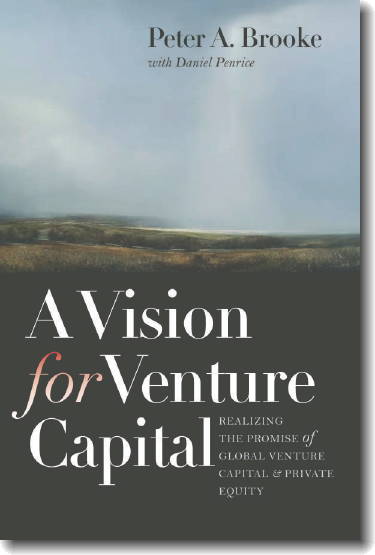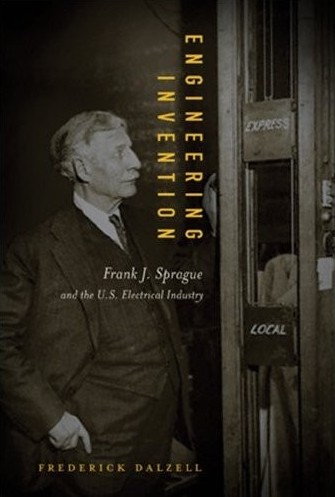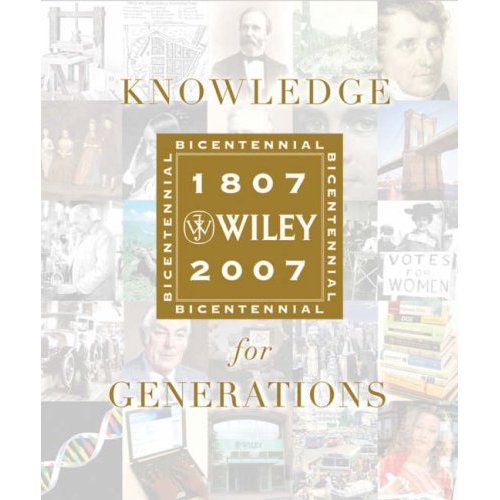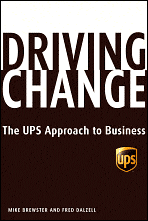 |
WINTHROP LIBRARY
2000-Present
 |
A Vision for Venture Capital: Realizing the Promise of Global Venture
Capital and Private Equity.. Peter A. Brooke, with Daniel Penrice (New Ventures Press/University Press of New England, 2009). A Vision for Venture Capital chronicles the distinguished career of Peter Brooke, one of the
world's pioneering venture capitalists. Nicknamed "the Johnny Appleseed of
venture capital" for his role in the industry's spectacular growth, Brooke
argues that private equity is an essential element of economic growth and
development. At a time when some believe that venture capital's best days
are behind it, and private equity has come under renewed criticism, A Vision
for Venture Capital, written with Winthrop's Daniel Penrice, offers a fresh
look at the industry's history, and how it can fulfill its potential in the
21st century. |
CLICK ON A LINK BELOW TO PURCHASE THIS BOOK:
Amazon.com
Review - "For over fifty years Peter Brooke has been one of the most
important factors in the evolution of the venture capital and private
investment industry in the United States and around the world. His
innovative ideas combined with mature and careful execution of his vision
has helped to set standards for a generation of investors and entrepreneurs.
For all interested in these subjects, this book is a 'must read'."
-James Wolfensohn, former president, the World Bank.
Review - "Venture capital today is at last emerging as a truly global
industry. This evolution validates Peter Brooke's vision of many decades
ago, and his pioneering efforts in this arena. This book provides a
fascinating retrospective of Peter's career, as well as a variety of
insights about the likely evolution of the global venture industry."
-Josh Lerner, Jacob H. Schiff Professor of Investment Banking, Harvard Business
School
 |
Engineering Invention:
Frank J. Sprague and the U. S. Electrical Industry, 1880-1900. Frederick Dalzell
(MIT Press, 2009). Frank J. Sprague (1857-1934) achieved an astonishing series of technological
breakthroughs, from pioneering work in self-governing motors to the first
full-scale operational electric railway system. A shrewd businessman, he
also commercialized his inventions and promoted them to financial backers
and the public. In Engineering Invention, Winthrop's Frederick Dalzell sets
Sprague's story against the backdrop of one of the most dynamic periods in
the history of technology. In a burst of innovation during these years,
Sprague and his contemporaries-Thomas Edison, Nicolas Tesla, George
Westinghouse, and others-transformed the technologies of electricity and
reshaped urban life. Dalzell reminds us that even as large corporations
became the driving force of technological change, the independent inventor
continued to play a vital role in promoting innovation. |
CLICK ON A LINK BELOW TO PURCHASE THIS BOOK:
Amazon.com
Review - "A study of Frank Sprague's important contributions to electrical
history is long overdue. Frederick Dalzell does this in impressive fashion
while using Sprague's life and career to inquire into the nature of
technological innovation and the role of the heroic inventor in American
industry."
- Paul Israel, Director and General Editor, Thomas A. Edison Papers Project, Rutgers University.
 |
Charity and Merit: Trinity
School at 300. Timothy C. Jacobson
(University Press of New England, 2009). Founded as a charity school supported by
the Anglican Church, Trinity survived lean years
throughout the 19th and early 20th centuries to become one of
New York City’s—indeed, the nation’s—preeminent independent educational institutions. How it
did so is the subject of this new book, scrupulously researched and well-written
with gorgeous illustrations drawn from Trinity’s Archives. Jacobson highlights
different styles of leadership and changes in the school’s constituencies,
adaptations to the evolving needs of America’s youth, and the place of elite education in
a democratic society. |
CLICK ON A LINK BELOW TO PURCHASE THIS BOOK:
Amazon.com
University Press of New England
Review - “Much has changed over the past three centuries,
but the mission of Trinity School has remained much the same—hard work and moral excellence.
Timothy C. Jacobson tells this remarkable story with economy and grace in this first ever
interpretive history of the institution.”
- Kenneth T. Jackson, Barzun Professor of History at Columbia University and Editor-in-Chief of the Enclyclopedia of New York City.
 |
After the Harkness Gift: A History of Phillips Exeter
Academy Since 1930. Julia Heskel and Davis Dyer
(University Press of New England, 2008). In 1930,
philanthropist Edward S. Harkness bestowed a gift of
$5.8 million on Phillips Exeter Academy, expecting to
inspire "something revolutionary" in secondary
education. Winthrop's Julia Heskel and Davis Dyer
explain how the Academy developed its distinctive
pedagogical approach in the 1930s and then
successfully adapted it to fundamental changes in
American society in the years ahead, including
coeducation, an increasingly diverse community, and
the emergence of a "post-industrial" or "knowledge"
economy. |
CLICK ON A LINK BELOW TO PURCHASE THIS BOOK:
Amazon.com
University Press of New England
Review - "Lively, cogent, and candid, After the Harkness Gift illuminates
the main turning points in the history of Phillips Exeter Academy. It tells of contests over curricular
tradition and change, insiders' accounts of governance and finance, and the varied ways in which Exonians
responded to social changes outside the Academy. It is a model of institutional history."
- David Tyack, Professor of Education and History Emeritus (Stanford University).
 |
Knowledge for Generations: Wiley and the Global Publishing Industry.
Robert E. Wright, Timothy C. Jacobson, and George David Smith (Wiley, 2007). Founded in New York City when Thomas
Jefferson was president, Wiley & Sons has been a major player in the publishing industry for two centuries. Now,
on the occasion of Wiley's bicentennial, three Winthrop historians bring this rich history to life, showing how
the company has reacted to trends within the publishing industry as well as to larger economic, social, and
cultural forces. Knowledge for Generations sheds light on the long-term strengths and weaknesses of Wiley's business,
illuminates the continuities and changes over time, and shows how family ownership has influenced the company's
strategies, values, and corporate culture. Drawing on unrestricted access to company archives and extensive interviews
with key executives, the authors tell a story of sustained business success amidst dramatic changes in the industry.
|
CLICK ON A LINK BELOW TO PURCHASE THIS BOOK:
Amazon.com
John Wiley & Sons
 |
Broken Buildings, Busted Budgets. Barry LePatner, with Timothy C. Jacobson (University of Chicago Press, 2007). An in-depth study of the U.S. construction industry, Broken Buildings provides insight into the causes of excessive cost overruns in everything from residential home-building and commercial construction to home renovations. LePatner, a New York lawyer specializing in the construction industry, explains how business, government, and the individual consumer fall prey to the inefficient practices of all parties involved in a major construction project, from contractors, designers, and suppliers to workers and labor unions. LePatner outlines a series of steps to mitigate this problem, including tougher contracts, background checks, and hiring experts to monitor builders. |
CLICK ON A LINK BELOW TO PURCHASE THIS BOOK:
Amazon.com
 |
Driving Change: The UPS Approach to Business. Mike Brewster and Frederick Dalzell (Hyperion, 2007). With unfettered access to its global shipping facilities,
its managers and workers, and its Archives, Winthrop authors Mike Brewster
and Frederick Dalzell go beyond the story of the big brown trucks with the golden
logo to study how UPS has become one of the most innovative companies in the
world and a model for others. The book points to the company's strong
ownership culture as a vital source of competitive advantage, enabling UPS
to rise to the challenges of new technology, expanding supply chains, and a
worthy rival, FedEx, and build a truly global enterprise. |
CLICK ON A LINK BELOW TO PURCHASE THIS BOOK:
Amazon.com
 |
Financing the Dream: The Federal Home Loan Bank of Indianapolis. Frederick Dalzell (Privately printed, 2007). This is a lavishly illustrated history of
the Federal Home Loan Bank of Indianapolis, one of a network of home loan
banks founded in 1932 as part of the New Deal. Written not only for the
bank's management and staff but also for its many partners in the
communities it serves, Financing the Dream explains how the bank has faced
many challenges over 75 years, including the Great Depression, the Second
World War, the postwar baby boom and suburbanization, the "stagflation" of
the 1970s, the Savings and Loan crisis of the 1980s, and the globalization
of financial markets at the turn of the 21st century. The bank's services,
people, technologies, and membership have all evolved to meet these
challenges, the book concludes, but its underlying mission-to enable home
ownership-has remained constant. |
 |
Performance Without Compromise: How Emerson Consistently Achieves Winning Results. Charles F. Knight, with Davis Dyer (Harvard Business School Press, 2005). This is the story of the man, Charles “Chuck” Knight, who led Emerson, the electric and electronics manufacturer, through most of an unprecedented 40 year run of rising earnings per share. Success, he argues, is based not only on impressive consistency but also the willingness to embrace fundamental change. |
CLICK ON A LINK BELOW TO PURCHASE THIS BOOK:
Harvard Business School Press, Amazon.com
Review – “Performance Without Compromise is a compelling look at a management process and value system that has proven successful in the face of challenge after challenge. It offers clear and relevant insight to managers seeking to excel on a global basis.” – Gary Hamel, Visiting Professor of Strategic and International Management at the London Business School, Chairman of Strategos and Director of the Woodside Institute.
 |
Mutually Beneficial: The Guardian and Life Insurance in America. Robert E. Wright and George David Smith (New York University Press, 2004).The Guardian Life Insurance Company of America is one of the most important companies in the history of the American insurance industry. Relying on exclusive access to the company's archives, interviews with current senior managers, the public record, and scholarly articles and monographs, Robert E. Wright and George David Smith provide a strategic analysis of Guardian from its founding to its standing in the insurance world today. |
CLICK ON A LINK BELOW TO PURCHASE THIS BOOK:
New York University Press, Amazon.com
Review – “[Wright and Smith] have written a remarkably lucid and elegantly organized history that keeps the major themes in view . . . The book stakes out a large terrain and elevates the field, standing alongside classics in the field of insurance history.” – Geoffrey Clark, Business History Review
Review – “This is, without doubt, a major contribution to the economics and history of life insurance in the twentieth century. Wright and Smith have provided, for example, the most comprehensive account yet of product development, and the section on investment strategies is also important.” – Robin Pearson, Accounting, Business, and Financial History
 |
Rising Tide: Lessons from 165 Years of Brand Building at Procter & Gamble. Davis Dyer, Frederick Dalzell, Rowena Olegario (Harvard Business School Press, 2004). Rising Tide traces Procter & Gamble’s rise from a small, family-owned soap and candle company to a global powerhouse whose leading brands, such as Ivory, Tide, Crest, and Pampers, are literally household names. With unprecedented access to P&G’s corporate archives and exclusive interviews with key executives and employees, Winthrop’s authors explore the evolution of those brands, while drawing insightful lessons about product innovation, global expansion, leadership transformation, and brand building. |
CLICK ON A LINK BELOW TO PURCHASE THIS BOOK:
Harvard Business School Press, Amazon.com
Review – “The book makes for an excellent history of a major corporation and a model of organization for coverage of a complex topic.” – Michael Landry, EH.net
Review – “These business historians have managed to transform a lot of facts and figures into a very readable book . . . more than a company history; it is, in fact, a lesson book of marketing milestones in consumer products during the 20th century.” – Business Horizons
Review – “Who would’ve thought a book about soap, diapers and toothpaste could be so interesting? Rising Tide . . . is at times as mesmerizing as the soap operas the company spawned . . . .” – Philadelphia Inquirer
Review – “As we gain some perspective on recent decades, with their consolidations, downsizing, and globalization trends, Rising Tide will grow in value as a resource to scholars. Its rich narratives will provide starting points for analyses of marketing and corporate decision making . . . Open Rising Tide to any page, and it will breathe freshness into classical lessons.” – Pamela Laird, Enterprise & Society
 |
Changing Fortunes: Remaking the Industrial Corporation. Nitin Nohria, Davis Dyer, Frederick Dalzell. (John Wiley & Sons, Inc., 2002). Changing Fortunes examines the rise and decline of the industrial corporation over the last quarter century, and what this means for owners, managers, employees, and society as a whole. |
CLICK ON A LINK BELOW TO PURCHASE THIS BOOK:
John Wiley & Sons, Amazon.com
 |
Cotton’s Renaissance: A Study in Market Innovation. Timothy Curtis Jacobson and George David Smith (Cambridge University Press, 2001). In the last decades of the 20th century, U.S. cotton growers lost over half of their market share—and then won it back. This study analyzes that remarkable feat through the story of Cotton Incorporated., a unique company that taught growers how to drive demand and, in the process, to adapt to a global marketplace. (Cambridge University Press, 2001) |
CLICK ON A LINK BELOW TO PURCHASE THIS BOOK:
Cambridge University Press, Amazon.com
Review – Cotton's Renaissance is a "well written, tightly argued, and generally persuasive book . . . that also provides what is perhaps the best survey of the history of cotton in the United States . . . It explains the way in which demand can be created.... And it transgresses historiographic boundaries between urban and rural, manufacturing and agriculture and Madison Avenue and Memphis." – Sven Beckert, Business History Review.
Review – “Cotton's Renaissance is a well-written and compelling story." The Journal of Interdisciplinary History
Review – "The authors discuss complex technologies and complex marketing problems with great skill and clear prose." Journal of American History
 |
Corning: A Story of Discovery and Reinvention. Davis Dyer (2001). Colorful and accessible, this companion volume weaves a historical tapestry out of images from the company’s past, bringing 150 years of people and their company to life. |
 |
Corning and the Craft of Innovation. Margaret B.W. Graham and Alec T. Shuldiner (Oxford University Press, 2001). Mastery of glass and related materials has been at the heart of Corning’s success since its earliest years. This volume analyzes the company’s remarkable ability consistently to generate new opportunities from research and to supply the industries of the future—from transportation, lighting, and television to telecommunications, environmental protection, and genomic research. |
CLICK ON A LINK BELOW TO PURCHASE THIS BOOK:
Amazon.com
Review – “The examples of Corning’s early interest in creating the right environment for innovation—and fitting scientific breakthroughs to the needs of the market place—shine through in [the author’s] thoughtful history of the company.” – Financial Times
Review – “This book is more than a typical corporate biography. There is little in the way of outright flattery . . . [The authors’] concern throughout is to identify the essential ingredients that have made Corning innovative for so long.” – The Economist
 |
The Generations of Corning: The Life and Times of a Global Corporation. Davis Dyer and Daniel Gross (Oxford University Press, 2001). Through 150 years of growth and change, Corning has repeatedly renewed its technologies and products, and reinvented itself several times over in the process. This volume traces the company’s evolution through seven generations of leadership as its products evolved from specialty glass to optical fibers and components. |
CLICK ON A LINK BELOW TO PURCHASE THIS BOOK:
Oxford University Press, Amazon.com
Review – “The Generations of Corning provides a corporate overview and historical review of the company’s major products, product lines, and family leadership. It is a well-done corporate history of a firm responsible for many glass-related innovations and products.” – Christopher J. Castaneda, Isis
 |
Celebrating 150 Years: The YMCA of Greater Boston, 1851 – 2001. Julia Heskel (2001). One of the oldest social service organizations in the country, the Y has grown from a small, storefront religious society into a major metropolitan institution. This volume chronicles that path, tracing the organization’s continuous effort to refine its mission of public service and adapt to Boston’s ever evolving social context. |
 |
TRW 1901 to 2001: A Tradition of Innovation. Timothy C. Jacobson (2001). Over the last one hundred years TRW has grown from manufacturing cap screws to supplying automotive components and systems to playing a leading roles in the aerospace industries. This engaging narrative tells the tale with vivid illustrations, putting peoples’ faces, voices, and work at the heart of the story. |
 |
A Nation Transformed by Information. Edited by Alfred D. Chandler, Jr. and James W. Cortada, with an essay by Margaret B. W. Graham (Oxford University Press, 2000) |
 |
Systems, Experts, and Computers. Edited by Agatha C. Huges and Thomas P. Hughes (with an essay by Davis Dyer) (MIT Press, 2000). |
 |
Wisdom from the Ancients. Thomas J. Fogueira, T. Corey Brennan, and Rachel Hall Sternberg (Perseus Publishing, 2001). This short volume offers enduring business lessons from Alexander the Great, Julius Caesar, and the illustrious leaders of ancient Greece and Rome. |
 |
The Reader's Companion to the American Presidency. Edited by Alan Brinkley and Davis Dyer (Houghton Mifflin, 2000). This volume collects and distills the latest scholarship on the nation's presidents, including biographical accounts of their individual administrations and a wealth of contextual social, political and economic data. Leading historians contribute to the collective portrait, blending authoritative coverage with provocative interpretation in a source that will become the standard reference for years to come. |
 |
Wisdom from the Robber Barons. George David Smith and Frederick Dalzell (Perseus Publishing, 2000). Drawing together quotations and anecdotes from the original titans of American industry, this collection offers a lively exploration of an earlier economic era that still holds vital lessons for venturing, building, and leading business today. What can John D. Rockefeller teach us about monopoly? Henry Ford about production? J.P. Morgan about investing? Or P. T. Barnum about marketing? It’s all here. |
|
 |
 |



















